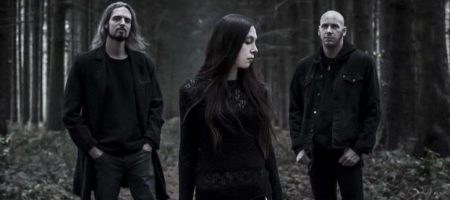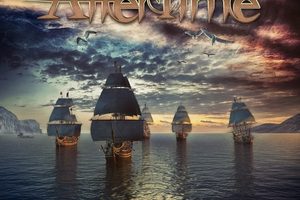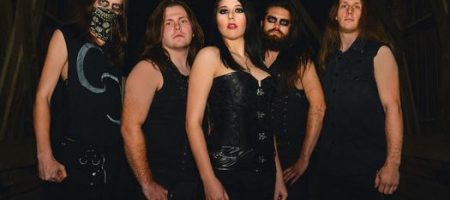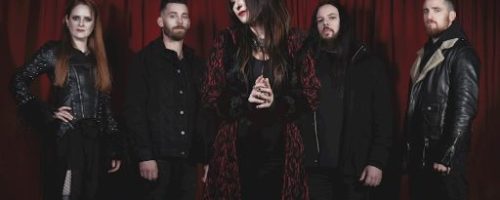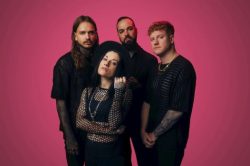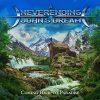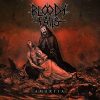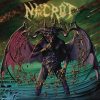AfterTime – The Shore Ahead
Tuesday, 1st September 2020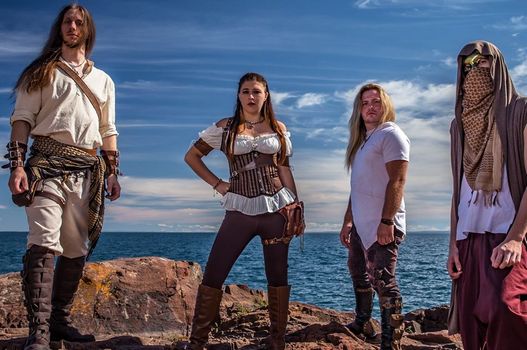
Minnesota-based symphonic/cinematic metal band AfterTime have released two EPs in their past, which showcased an act on the rise within the genre. Their sense of melody and epic scope caught the ear, and this month marks the band’s first step into full-length territory. The Farthest Shore fulfills all of the early promise of the band and takes things a step further. Soaring choruses, bombastic synths and choir inclusions, and energetic riffs make it a release to remember. We chatted with vocalist Sarah Wolf about her thoughts on the album, what they’ve learned on the road, and being a symphonic metal act in the US.
Dead Rhetoric: How do you feel that The Farthest Shore steps things up for the band, so to speak?
Sarah Wolf: I see it as an improvement in every way that we can. From writing to production. At the same time, making sure we have that core sound that makes us ‘us.’ I think we accomplished that.
Dead Rhetoric: What would you that the core sound of the band is?
Wolf: Further than the category of symphonic metal, we specifically call ourselves cinematic metal. What that boils down to is doubling down on the orchestrations, which are just as much a part of the song as any of the other instruments. We featured more choir this time, and I’d like to continue doing that in the future. As well as making sure each song has its own identity. We didn’t want to make songs that all sound the same, so making sure that each song has a distinct identity and some catchy melodies is important. People have yelled at me for getting our songs stuck in their head [laughs].
Dead Rhetoric: What sort of an impact do you feel that the MPLS choir added to the music?
Wolf: It adds a lot of depth, and I think it, if you used correctly can make a song much more epic. This time specifically, we used a live, 16-person professional choir. We were really happy to have them, and have access to.
Dead Rhetoric: Was there anything that you thought about doing in particular with some of the longer tracks that bookend the album?
Wolf: The first track, “Battle of the Sea,” is just under 10 minutes. One really cool thing we have in that song, is after the second chorus, there’s an instrumental section. After that section, it dies down and everything gets real quiet. We bring in some ambient water sounds. There’s a section in the middle that we call the siren section. There’s myself and two guest vocalists, Melissa Ferlaak and Angel Wolf-Black, who are weaving in with each other doing these foreign/exotic sounds that eventually fade back and the strings pick up and start to lead us into another section. It was really experimental and we were winging it as we went but it was really fun to put it together. It came out sounding so much better than we could have imagined.
With the final track, “The Farthest Shore,” it sits close to 14 minutes. It’s broken down into sections. You see that on the tracklisting as well. There’s three movements. The song really does take you on a journey through all of these emotional peaks and troughs. There’s heavy parts, there’s lighter parts, there’s delicate parts, and there’s loud and bombastic parts – there’s a bit of everything. When you go to the restaurant and you see the appetizers. The other songs on the album are the egg rolls or the chicken wings or whatever. “The Farthest Shore” is like the sampler, where’s there’s everything and if you want to feel completely fulfilled in the end, that’s the one you go for [laughs].
Dead Rhetoric: One thing I like to talk about with symphonic bands in particular is the ‘more is more’ concept in the genre and how bands keep adding more layers to the music. Given the band’s evolution, how do you look to avoid doing too much of that?
Wolf: With symphonic metal, I have no envy for anyone who does mixing or mastering. There’s so much to balance! Between how every many vocalists, guitarists, bass, drums, as well as a full orchestra and god forbid, a choir. It’s a huge balancing act! I think it’s important to know which songs need all of the elements and which songs can be lighter on certain things. Choir isn’t used on every single song on the album. Some songs are just me singing leads, other songs I have backing vocals and harmonies thrown in. there’s one song on the album where there is no guitar or bass, and the drums are tribal – it’s the “ballad” on the album, but having that variety is important.
As far as the length of songs go, there’s a lot of bands that write the longer song because long is epic, right? You see these longer songs from bigger bands out there and they are so epic, so you write a song that’s 10-minutes but it could have been 5-minutes and have the same emotional impact. So I think it’s important to know when a song demands a longer length, and what it takes for it to earn that length. Unless you are a prog metal band, which go ahead and throw a 20-minute song on there for all we care [laughs], but if you are going to write a 10-plus minute song, make sure that someone is going to be really excited to sit through that song and keep them hooked the whole time. We aren’t going to throw a 14-minute song on each album, but this one kind of demanded it because it’s a synopsis of the story of the album condensed into one song.
Dead Rhetoric: The crowdfunding for this album wasn’t the first one that you have done. Has crowdfunding allowed you to maintain more control over what you are doing with the band?
Wolf: Yeah, absolutely. That was a discussion we had early on. We were all pretty much on the same page as far as not wanting to pursue any record deals or contracts because we wanted to maintain ownership over the masters of our songs and have the final say in our branding – all the way down to what we wear on stage and the types of merch we offer. In order to make that work, the money has to come from somewhere. The training that we have gone through, on various channels online, has come down to seeking out your superfans. The ones who are crazy for your exact genre of music – bring them in and give them a culture to be a part of. Don’t just blast advertisements all the time. But invite them to support you through crowdfunding. It’s easy to say, but very tough to execute [laughs].
We’ve done a really good job of finding some really dedicated fans. It’s taken time, and its taken financial investment. We are just now starting to see the results from that. The pre-order campaign for this album was successful, but that came after an unsuccessful Indiegogo campaign last year. You have to know what your numbers are and what is realistic to expect from the fans that you have and what you are trying to accomplish. I think that we have finally found the balance, but it’s been a rocky road getting there. We’ve had success, and I’m not going to say failures but learning experiences leading up to this. We all agree that it is worth it because we get to maintain that control.
Dead Rhetoric: Now that you have the hang of it, do you see crowdfunding as your way forward, or would you eventually like to sign with a label?
Wolf: We have revisited that conversation recently, and we may be open to it – this is something that I have learned from being in the industry now for a few years. Your options are not just independent or record label. There are in betweens. You can just get a deal for distribution. Or you can sign a contract to help with booking tours and things. Those are the things that we could use some additional help with, as we look to do some touring to promote this album, and get some distribution overseas and other parts of the world. Some things really do still require those industry connections that labels have.
I think we are approaching a point where it can all be done independently but we aren’t quite there yet. We are open to that if it’s that kind of contract. But as far as funding goes, we are looking to continue that. Not with just campaigns as we have, but ultimately our long term goal is to pursue something like Patreon or something similar. Where we can give consistent content in exchange for a consistent income. That would be our long term goal.
Dead Rhetoric: You mentioned the overseas thing. Playing a style that’s much more popular in Europe, do you feel it’s been harder to establish a foothold for the band in the US?
Wolf: It’s a complicated issue. We have the Internet now, so as far as Internet promotion goes it hasn’t held us back at all. We have fans in the UK, Germany, Japan, and Australia. As far as shows go, I think there’s just enough of a presence of symphonic metal, or if you want to broaden that out to generally female-fronted metal, there’s enough of a network. We have only done one tour so far, but we got to co-headline with another female-fronted symphonic metal band, Seven Spires, and that tour was a big success overall. We picked up so many new fans, we sold a ton of merch, and we funded the drum recordings from the profits. It was a lot more successful than we went into it, hoping that it would be [laughs].
I have thought about what if we would pack up and move to Europe…for a number of reasons these days. But it would make it more difficult because the US is still a very valid market. We see the genre growing in the coming years, and we’ve seen it grow already since we have started the band. To come from Europe and tour the US is infinitely more complicated and expensive than to do it the other way – living in the US and tour literally anywhere else. I think that it’s important that we are US citizens, and that gives us a leg up over European bands. We can still market to Europe, and once we are allowed to leave our ‘time out square’ in the US, it will be expensive to go to Europe or parts of Asia or Australia, in the distant future.
Dead Rhetoric: What have you learned from being on tour? Do you feel any of that was mixed into the new album?
Wolf: I probably learned new things every day of that tour [laughs]. You can only prepare so much. We did some extensive preparation beforehand, such as bringing in our vehicle for a check-up and making sure the oil change was topped off, as well as practicing stamina. Singing every night was one of my homework assignments from by voice teacher. But once you are out on the road, you are going to come across things that you didn’t expect or plan for.
It was a benefit to be touring with Seven Spires specifically, one because they are such an awesome group of people and we got along so well with them, but also because they had prior tour experience. So they already knew how some of this worked. So we were able to ask them a lot of different questions, or let them take the lead on certain things. So that was extremely beneficial.
We also learned things about being flexible. If you are stuck in Colorado in the middle of a blizzard, you are going to have to make some tough decisions if you aren’t going to make it in time for your show in Salt Lake City. But, it also comes down to performing every night and finding your rhythm as far as the day’s schedule goes and the show itself. Opening up to a new crowd every night. We did get to bring along one new song on that tour, so it got a lot of use during the tour. It got a lot of exposure, and the audience really seemed to like it. It was nice to test that one out, and then going onto record it this year, I felt more confident because I had all of that experience performing it already.
Dead Rhetoric: What drew you towards symphonic metal?
Wolf: To be honest, prior to joining the band my metal exposure was extremely limited. Mostly, at the time, what we would refer to as screamo bands in high school. Early Escape the Fate, Hawthorne Heights, Black Veil Brides…that kind of stuff. Brad [Sturgis] and I ran in a lot of the same circles in Rochester, Minnesota. When they were in need for a vocalist for the band, I was the first one that came to their mind. They reached out with a Facebook message that they played a certain time of music and who they were, and that they would like to talk with me about being a vocalist. I had never been in a band before, much less a metal band, but when an opportunity like that waltzes into your inbox…I knew I would regret it if I said no. I agreed to meet with them.
We met a Denny’s. It was Brad, Chris [Radke], and AJ [Blakesley] and they all decided to wear their stage clothes to the meetup [laughs]. I don’t know if they were trying to intimidate me, but they did intimidate me. Chris had this long coat with buckles, and there were straps and it was black – I was like, “What did I get into here?” But as we talked, and they went into more of what the band was and how they were serious about it. They wanted to make it a career, and I wanted to make music my career too but didn’t have a direction yet. It kind of felt serendipitous that it all came together.
When I agreed to joining the band, I dove headfirst into the genre as well as the current songs that they had written up to that point. I got to know them as well as I could, since I would be in a band and wanted to be friends with them. So I wanted to get over that weird, awkward ‘I don’t know you very well’ phase as soon as possible.
I was dedicated from the start, and I knew that there was so much I didn’t know, which included the genre of music. They had me start off with Nightwish, and I proceeded to listen to the entire discography in a week. I absolutely fell in love with them. Honestly, the rest is history from there!
Dead Rhetoric: As you have mentioned, AfterTime is a cinematic band. What sort of movie would you put it as?
Wolf: If I had to limit it to a genre, I would probably say action/adventure. When it comes down to targeting fans with Facebook ads and things like that, some of the things we will reference is Pirates of the Caribbean or Lord of the Rings or Harry Potter. That sweeping John Williams score. You know the melody to Harry Potter, you know the melody to Jaws or Indiana Jones or Star Wars. That’s something we brought into our music – you have those recognizable melodies that end up getting stuck in people’s heads. But that ends up being a good thing.
Dead Rhetoric: Do you have any short or long term goals for Aftertime right now?
Wolf: Short term, we are inching towards the official release of the album. We are doing a lot of preparation for that, such as getting things printed now and getting the merch put together to send out to fans. We’ve got two more singles that we are going to be putting out prior to the release so we are working on those.
Long-term, we already have material put together for what comes after this album. Fans won’t have to wait as long for new material, hopefully ever again if we can help it. Ultimately, we do want to make this our full-time career, where day jobs are either minimal or unnecessary. Hopefully we can continue to make music that moves people, and we can travel the world to perform it.
Dead Rhetoric: As you said earlier, we are still in this time out right now, what plans do you have aside from the album release?
Wolf: We can’t exactly put together a tour right now, or any live shows unfortunately. We did look into a couple options to see if we could do a live stream digital concert but we haven’t made much headway there so far. It would have been really awesome to do but what we were hoping to do included the use of a venue. I think because there are so few options for musicians that the few that are offering options are swimming in show requests right now. So the jury is still out on that.
But that allows us to do more behind the scenes, and connect with our fans digitally. Like I said earlier, we want to build that culture and develop relationships with our superfans. I think that is what we are prioritizing now. Hopefully as we get into 2021, shows will start opening up again and we plan to be pretty active with our live performances once we are allowed to be.











